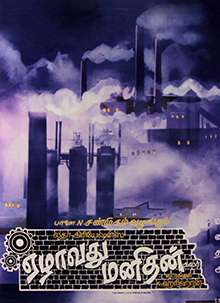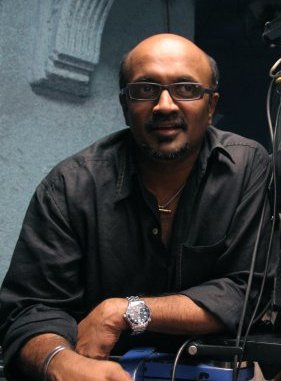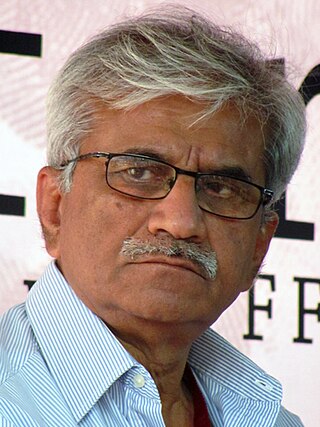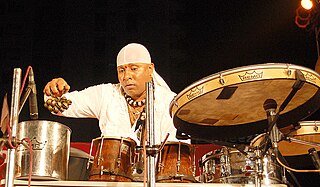Related Research Articles

Mani Kaul was an Indian director of Hindi films and a figure in Indian parallel cinema. He graduated from the Film and Television Institute of India (FTII) where he was a student of Ritwik Ghatak and later became a teacher. Starting his career with Uski Roti (1969), which won him the Filmfare Critics Award for Best Movie, he went on to win four of them in all. He won the National Film Award for Best Direction in 1974 for Duvidha and later the National Film Award for his documentary film Siddheshwari in 1989.

Adoor Gopalakrishnan is an Indian film director, script writer, and producer and is regarded as one of the most notable and renowned filmmakers in India. With the release of his first feature film Swayamvaram (1972), Gopalakrishnan pioneered the new wave in Malayalam cinema during the 1970s. In a career spanning over five decades, Gopalakrishnan has made only 12 feature films to date. His films are made in the Malayalam language and often depict the society and culture of his native state Kerala. Nearly all of his films premiered at Venice, Cannes and Toronto International Film Festival. Along with Satyajit Ray and Mrinal Sen, Gopalakrishnan is one of the most recognized Indian film directors in world cinema.

Hariharan is an Indian film director who has directed over 50 Malayalam films. His movies mainly revolve around the cultural and relational aspects of a typical Keralite society. His most notable works include Sharapancharam (1979), Panchagni (1986), Idavazhiyile Poocha Mindappoocha (1979), Amrutham Gamaya (1987), Oru Vadakkan Veeragatha (1989), Sargam (1992), Parinayam (1994) and Pazhassi Raja (2009) which has won him wide critical acclaim. In 2019, he was awarded the J. C. Daniel Award, Kerala government's highest honour for contributions to Malayalam cinema.

Srinivasa Sarja, better known by his stage name Arjun Sarja or simply Arjun, is an Indian actor, producer, and director who works predominantly in Tamil cinema in addition to Telugu and Kannada films and a few Malayalam and Hindi films. Referred to by the media and his fans as "Action King" for his roles in action films, Arjun has acted in more than 160 films, most of them being lead roles. He is one of few South Indian actors to attract fan following from multiple states of India. He has directed 12 films and also produced and distributed a number of films.
Raghuvaran Velayutham was an Indian actor who predominantly acted in films made in South India. He has acted in more than 200 Tamil, Telugu, Malayalam, Kannada and Hindi films. According to the Hindustan Times, "The actor had carved a niche for himself with his special style and voice modulation."

Ezhavathu Manithan is a 1982 Indian Tamil-language film co-written and directed by K. Hariharan. Inspired by a real-life incident, the film focuses on environmental pollution and exploitation of industrial workers. Starring Raghuvaran in his first lead role, it features a host of newcomers playing other prominent roles. The film's soundtrack was made up from an album composed by L. Vaidyanathan with the lyrics of Tamil poet Subramania Bharati.

Ravi K. Chandran is an Indian cinematographer and film director who predominantly works in Hindi, Malayalam, and Tamil-language cinema. He is the founding member of the Indian Society of Cinematographers (ISC) and has won two Filmfare Awards and one Southern Filmfare Award.

Dr. Jabbar Patel is a former paediatrician and a Marathi-language theatre and film director of India. His production of Vijay Tendulkar's play Ghashiram Kotwal, in 1973 is considered a classic in Modern Indian Theatre. Patel received Filmfare Marathi Lifetime Achievement Award at 7th Filmfare Awards Marathi.

Sivamani, commonly known by his stage name Drums Sivamani, is an Indian percussionist. He plays many instruments including drums, octoban, darbuka, udukai, ghatam and kanjira. He performed drumming during the Indian Premier League in 2008 and 2010. He is affiliated with the Chennai Super Kings team, but gained recognition through his role as A. R. Rahman's lead percussionist. They have been close friends since childhood. In 2019, he was conferred with Padma Shri.

Ghashiram Kotwal is a Marathi play written by playwright Vijay Tendulkar in 1972 as a response to the rise of a local political party, in Maharashtra. The play is a political satire, written as historical drama. It is based on the life of Nana Phadnavis (1741–1800), one of the prominent ministers in the court of the Peshwa of Pune and Ghashiram Kotwal, the police chief of the city. Its theme is how men in power give rise to ideologies to serve their purposes, and later destroy them when they become useless. It was first performed on 16 December 1972, by the Progressive Dramatic Association in Pune. Jabbar Patel's production of the play in 1973 is considered a classic in Modern Indian Theatre.

Saeed Akhtar Mirza is an Indian screenwriter and director in Hindi films and television. He is the maker of notable parallel films such as Mohan Joshi Hazir Ho! (1984), Albert Pinto Ko Gussa Kyoon Aata Hai (1980), Salim Langde Pe Mat Ro (1989) and Naseem (1995), which won two National Film Awards in 1996. Saeed Mirza Was Honored with Lifetime Achievement Award at ICA – International Cultural Artifact Film Festival in 2020.

Ameer Sultan is an Indian film director, producer and actor, working in the Tamil film industry.
Bhaskar Chandavarkar was an Indian sitar player, academic and film and theatre composer who worked with well-known directors of Indian cinema like Mrinal Sen, Girish Karnad, Aparna Sen, K. G. George and Amol Palekar in various languages including Marathi, Hindi, Kannada, Malayalam, Bengali and Oriya and was known for his blending of Indian classical and western music.

Lakshminarayana Vaidyanathan was an acclaimed musicologist, music director and composer, trained in the classical Carnatic music tradition. Vaidyanathan was born in Chennai to V. Lakshminarayana, and Seethalakshmi, both accomplished musicians. He was the elder brother of accomplished violinist duo L. Shankar and L. Subramaniam. He created the tunes of the iconic TV serial Malgudi Days. All three brothers received their musical training from their father.

G. Dhananjayan (GD) is an Indian film producer, distributor, columnist, author of four books on Indian films and founder-director BOFTA Film Institute. He has produced films in the Tamil, Telugu, Malayalam and Hindi languages, including Sankat City (2009), Kanden Kadhalai (2009), Mugamoodi (2012), Anjaan (2014) and Irudhi Suttru (2016), Kaatrin_Mozhi (2018), Kabadadaari (2021), Kodiyil Oruvan (2021) and many other films. He has won two National Film Awards.

Chabiwali Pocket Watch is a 2006 short film written and directed by Vibhu Puri and produced by the Film and Television Institute of India. The film is set in Old Delhi and deals with the story of a romantic Urdu poet, now dying anonymously, and the struggle between his daughter and an opportunist publisher. The film was the official entry from India to the Student Academy Awards. It was also a chosen to be a part of Indian Panorama in 2006.

Apurba Kishore Bir, also known as A. K. Bir, is an Indian film cinematographer, screenwriter and director. An alumnus of the Film and Television Institute of India, Pune, he worked in various Ad-films and documentaries before making his feature-film debut. He won the National Film Award for Best Cinematography for 27 Down, his debut film. His directional debut Aadi Mimansa won the Nargis Dutt Award for Best Feature Film on National Integration. Bir's other directional ventures Lavanya Preeti and Baaja were bestowed with the National Film Award for Best Children's Film. As of 2014, he has won nine National Film Awards—including three for Best Cinematography—and is one of the directors of National Film Development Corporation of India.

The 11th Chennai International Film Festival took place in Chennai, Tamil Nadu, India from 12 to 19 December 2013. The event was organised by the Indo Cine Appreciation Foundation (ICAF) with support from the Government of Tamil Nadu. The festival was curated by actress-director Suhasini Maniratnam and inaugurated by Kamal Haasan and Aamir Khan. The Japanese drama Like Father, Like Son marked the beginning of the fest.
K. Rajeshwar is an Indian film director, who has worked in Tamil films. He was active primarily as a film maker and a writer in the 1990s collaborating in ventures which often included Pratap Pothan.
Ghashiram Kotwal is a 1976 Indian Marathi-language film, which is an adaptation of Vijay Tendulkar's play of the same name. Tendulkar himself wrote the screenplay. Coming at the height of the Parallel cinema movement in India, the film was an experiment in collective filmmaking. It was produced by YUKT Film Cooperative, a 16-member collective consisting mostly of graduates of the Film and Television Institute of India. The title role was played by Om Puri, who made his debut with this film. The final shot of the film lasts for more than ten minutes. According to K. Hariharan, one of the four directors of the film, this shot is unique in film history as "the world’s longest shot on a standard reel of 1,000 feet to be shot by four camera operators".
References
- ↑ "Dubashi (The Translator)". Children's Film Society of India . Retrieved 23 November 2014.
- 1 2 3 4 5 Hariharan, K. (9 July 2000). "Merging with the mainstream". The Hindu . Archived from the original on 4 May 2014. Retrieved 1 July 2013.
- ↑ Dutta, Medha (7 February 2014). "Five films from FTII kitty for 64th Berlin film fest". The Times of India . Retrieved 23 November 2014.
- 1 2 "Dubashi (The Translator)". Children's Film Society, India . Retrieved 7 July 2013.
- 1 2 "30th National Film Awards". Directorate of Film Festivals. p. 24. Archived from the original (PDF) on 3 October 2015. Retrieved 7 July 2013.
- 1 2 Kamath, Sudhish (15 May 2010). "Lessons from cinema". The Hindu . Archived from the original on 4 May 2014. Retrieved 1 July 2013.
- ↑ "35th Moscow Film Festival -1983". Moscow International Film Festival. Retrieved 7 July 2013.
- ↑ "Film appreciation course at FTII". The Times of India. 2 June 2013. Retrieved 23 November 2014.